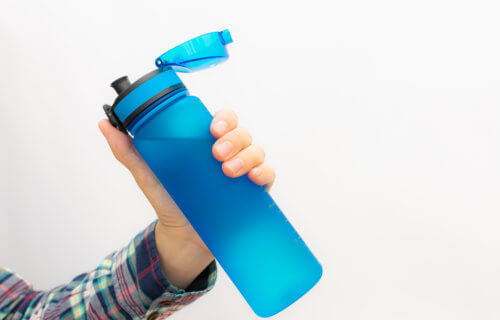COPENHAGEN, Denmark — Water lovers will tell you that not all water tastes the same. However, if your water tastes different when it’s in a reusable plastic bottle, a new study finds it may be a cause for concern. Researchers from the University of Copenhagen found hundreds of chemical substances in tap water stored in soft plastic reusable bottles. The findings suggest an urgent need for better regulation and manufacturing standards to mitigate the impact on human health.
“We were taken aback by the large amount of chemical substances we found in water after 24 hours in the bottles. There were hundreds of substances in the water – including substances never before found in plastic, as well as substances that are potentially harmful to health. After a dishwasher cycle, there were several thousand,” says Jan Christensen, a professor of environmental analytical chemistry at Copenhagen’s Department of Plant and Environmental Sciences, in a university release.
The findings reveal the increase in chemical substances is not just a problem for reusable plastic water bottles. Dr. Christensen and fellow researcher Selina Tisler worked together to study the type of chemical substances found in the most popular soft plastic reusable bottles. For example, the plastic bottle for dishwasher soap held over 400 different substances. More than 3,500 substances were from the dishwater soap itself.
A majority of chemicals detected are currently unknown to chemists, suggesting there is an unclear level of toxicity for at least 70 percent of the chemicals in reusable plastic bottles.
What’s ending up in your water?
The chemical causing the most concern are photo-initiators in the water of reusable bottles. These chemicals can disrupt endocrine hormones and increase the risk of cancer. The researchers also found plastic softeners, antioxidants, and release agents from the manufacturing of plastic bottles, as well as diethyltoluamide (DEET) — which is the active substance in mosquito spray.
The researchers also looked at the chemical substances in tap water left in new and used plastic bottles for 24 hours. The bottles were either new or old and observed before and after machine washing. The team also measured chemical substances after washing the bottles in a dishwasher or rinsing them thoroughly in tap water.
Bottles washed in the dishwasher had the most chemicals. The most likely explanation is because the dishwasher wears down the plastic and increases the chance for leaching — a transfer of chemicals from plastic to food or drinks.
“We care so much about low levels of pesticides in our drinking water. But when we pour water into a container to drink from, we unflinchingly add hundreds or thousands of substances to the water ourselves. Although we cannot yet say whether the substances in the reusable bottles affect our health, I’ll be using a glass or quality stainless steel bottle in the future,” Dr. Christensen concludes.
The findings are published in the Journal of Hazardous Materials.
